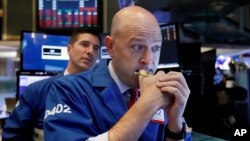World stocks are climbing Friday after two days of sharp losses. Major U.S. stock indexes are up more than 1 percent, but they're still on track for their biggest one-week loss since late March.
Technology and internet companies were some of the hardest hit over the last two days and they led the market higher Friday. Apple climbed 2.7 percent to $220.18. Consumer-focused companies also rallied, as Amazon jumped 3.8 percent to $1,783.96 and Netflix surged 4.7 percent to $336.30.
The S&P 500 index climbed 37 points, or 1.4 percent, to 2,766 at 9:45 a.m. Eastern time. The benchmark index tumbled 5.3 percent over the past two days and as of Thursday it had fallen for six consecutive days. The S&P is down 5.6 percent from its latest record high, set Sept. 20.
The Dow Jones Industrial Average jumped 305 points, or 1.2 percent, to 25,358. The Nasdaq composite surged 138 points, or 1.9 percent, to 7,467. The Russell 2000 index gained 17 points, or 1.2 percent, to 1,563. That index, which is made up of smaller and more U.S.-focused companies, has fallen into a 10 percent "correction" since reaching a record high at the end of August.
On the New York Stock Exchange, winners outnumbered losers eight to one.
Stocks in Europe and Asia also recovered some of their recent losses. The French CAC 40 and the DAX in Germany both rose 0.8 percent while Britain's FTSE 100 was 0.7 percent higher. Japan's Nikkei 225 index gained 0.5 percent after sinking early in the day and following a nearly 4 percent loss on Thursday. Hong Kong's Hang Seng surged 2.1 percent and the Kospi in South Korea rose 1.5 percent.
The market's recent losing streak started when strong economic data and positive comments from Federal Reserve Chair Jerome Powell helped set off a wave of selling in the bond market. Investors were betting that the U.S. economy would keep growing at a healthy pace. The sales pushed bond prices lower and yields higher. That drove interest rates sharply higher, which worried investors who felt that a big increase in interest rates could eventually stifle economic growth. Higher yields also make bonds more appealing to investors versus stocks.
The worst losses went to stocks that have led the market in recent years, including technology companies, as well as companies that do better when economic growth speeds up, like industrial firms.
Banks rose as they began to report their third-quarter results. Citigroup jumped 2.4 percent to $70.04. Last year's corporate tax cut and rising interest rates have helped banks make more money.
Bond prices turned lower as the stock market stabilized. The yield on the 10-year Treasury note rose to 3.16 percent from 3.13 percent.
High-dividend stocks lagged the rest of the market, and utilities and household goods makers were little changed. Those stocks held up a bit better than the rest of the market over the last six days. Investors view them as relatively safe, steady assets that look better when growth is uncertain and the rest of the market is in turmoil.
U.S. crude oil added 0.6 percent to $71.43 a barrel in New York. Brent crude, the international standard, was up 0.6 percent to $80.77 a barrel in London.
The dollar rose to 112.17 yen from 111.94 yen. The euro fell to $1.1548 from $1.1594.




